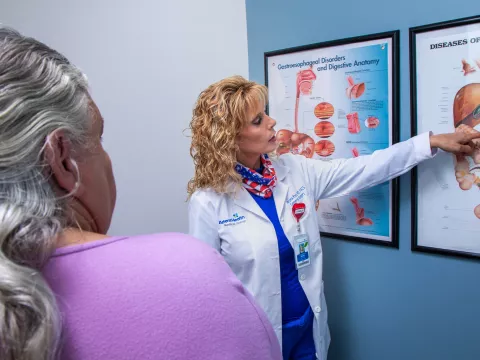- AdventHealth

Ovarian cancer is the deadliest gynecologic cancer: It only comprises about two and a half percent of all cancers in women, yet causes about five percent of the deaths. Because ovarian cancer has few symptoms in its early stages, it often goes undetected until it’s more advanced and more difficult to treat.
While ovarian cancer usually affects women over 60, all women are at risk. Genetic counseling and testing can help you understand your risk and is especially recommended if you’ve had breast cancer, or you have a family history of breast cancer.
Ovarian Cancer Risk Factors
Risk factors for ovarian cancer include:
- Age
- Being overweight or obese
- Family history of ovarian cancer or breast cancer
- Having a first child after age 35
- Hormone therapy after menopause
Breast Cancer, Ovarian Cancer and Your Genes
Your family history is important because you may have inherited gene mutations in BRCA1 and BRCA2. These mutations are known to increase your risk for breast cancer, but they also increase your risk for ovarian cancer.
About 12 percent of women will develop breast cancer. By comparison, 72 percent of women who have the BRCA1 mutation and about 69 percent who have the BRCA2 mutation will have breast cancer by the time they are 80.
Similarly, about 1.3 percent of women will develop ovarian cancer. About 44 percent of women with BRCA1 and 17 percent of women with BRCA2 will develop ovarian cancer by age 80.
Ovarian Cancer Treatment and Survival
Surgery is usually the primary treatment for ovarian cancer, especially in its early stages. However, women with BRCA1/2-related ovarian cancer may have a better chance of survival because these cancers may respond to chemotherapy better.
Can You Reduce Your Risk?
If you have a known family history of ovarian or breast cancer, one way to reduce your risk is to have your ovaries surgically removed before cancer develops. Another less invasive way to manage your risk is genetic counseling and testing.
Genetic Counseling with BRCA1 AND BRCA2
Although genetic testing is becoming more common, many people don’t realize the importance of genetic counseling before having any tests. Your genetic counselor can help you make informed decisions about genetic testing for BRCA1, BRCA2and other inherited mutations. Family members can attend counseling with you to ask questions and take notes.
Genetic Testing for BRCA1 AND BRCA2
Your genetic counselor will collect a blood sample in the office and send it to the lab to check for various genetic mutations. It’s best to test for genetic mutations you’re most concerned about, like BRCA1 and BRCA2 for ovarian or breast cancer. The more kinds of mutations you test for, the more likely you’ll find one. And while the likelihood this mutation may cause some cancer or other conditions may be very small, it may have lasting effects on your emotional health. Be sure to discuss which genes to test for with your genetic counselor.
Once you’ve been tested, you should have your results in about four weeks.
Ovarian Cancer Prevention
If genetic testing proves positive for either BRCA1 or BRCA2, you and your doctor can discuss prevention options. While you can’t change some risk factors like aging or your family history, you can directly impact some. For example, you can:
- Choose not to have hormone therapy after menopause
- Maintain a healthy weight
- Use oral contraceptives in your 20s and 30s since they can decrease risk
More aggressive options include tubal ligation and hysterectomy. And, if surgery isn’t an option, periodic screenings can help.
Talk with your doctor right away if you believe genetic counseling and testing is right for you. Together, you can decide on your best course of action and walk through any treatment that may be needed.
Women’s Care You Can Trust
Women have unique health needs. And you do, too. Let us customize a whole-health women’s care plan to help you live your best life.



